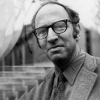Thomas Kuhn

Thomas Kuhn
Thomas Samuel Kuhnwas an American physicist, historian, and philosopher of science whose controversial 1962 book The Structure of Scientific Revolutions was influential in both academic and popular circles, introducing the term "paradigm shift", which has since become an English-language idiom...
NationalityAmerican
ProfessionPhilosopher
Date of Birth18 July 1922
CountryUnited States of America
Thomas Kuhn quotes about
science political-revolution impact
As in political revolutions, so in paradigm choice--there is no standard higher than the assent of the relevant community. To discover how scientific revolutions are effected, we shall therefore have to examine not only the impact of nature and of logic, but also the techniques of persuasive argumentation effective within the quite special groups that constitute the community of scientists.
views fields transition
To turn Karl [Popper]'s view on its head, it is precisely the abandonment of critical discourse that marks the transition of science. Once a field has made the transition, critical discourse recurs only at moments of crisis when the bases of the field are again in jeopardy. Only when they must choose between competing theories do scientists behave like philosophers.
gestalt steps transition
The transition between competing paradigms cannot be made a step at a time, forced by logic and neutral experience. Like the gestalt switch, it must occur all at once (though not necessarily in an instant) or not at all.
practice community research
The resolution of revolutions is selection by conflict within the scientific community of the fittest way to practice future science. The net result of a sequence of such revolutionary selections, separated by periods of normal research, is the wonderfully adapted set of instruments we call modern scientific knowledge.
understanding may evolution
We may... have to relinquish the notion, explicit or implicit, that changes of paradigm carry scientists and those who learn from them closer and closer to the truth... The developmental process described in this essay has been a process of evolution from primitive beginnings-a process whose successive stages are characterized by an increasingly detailed and refined understanding of nature. But nothing that has been or will be said makes it a process of evolution toward anything.
science anecdotes transformation
History, if viewed as a repository for more than anecdote or chronology, could produce a decisive transformation in the image of science by which we are now possessed.
fall opponents criteria
Each paradigm will be shown to satisfy more or less the criteria that it dictates for itself and to fall short of a few of those dictated by its opponent.
issues political-revolution community
As in political revolutions, so in paradigm choice-there is no standard higher than the assent of the relevant community... this issue of paradigm choice can never be unequivocally settled by logic and experiment alone.
men vision lenses
Literally as well as metaphorically, the man accustomed to inverting lenses has undergone a revolutionary transformation of vision.
problem claims crisis
Probably, the single most prevalent claim advanced by the proponents of a new paradigm is that they can solve the problems that led the old one to a crisis..
powerful way revolution
The crises of our time, it becomes increasingly clear, are the necessary impetus for the revolution now under way. And once we understand nature's transformative powers, we see that it is our powerful ally, not a force to feared our subdued.
believe research normal
Under normal conditions the research scientist is not an innovator but a solver of puzzles, and the puzzles upon which he concentrates are just those which he believes can be both stated and solved within the existing scientific tradition.
philosophical thinking unlocking
It is, I think, particularly in periods of acknowledged crisis that scientists have turned to philosophical analysis as a device for unlocking the riddles of their field. Scientists have not generally needed or wanted to be philosophers.
mean science past
'Normal science' means research firmly based upon one or more past scientific achievements, achievements that some particular scientific community acknowledges for a time as supplying the foundation for its further practice.